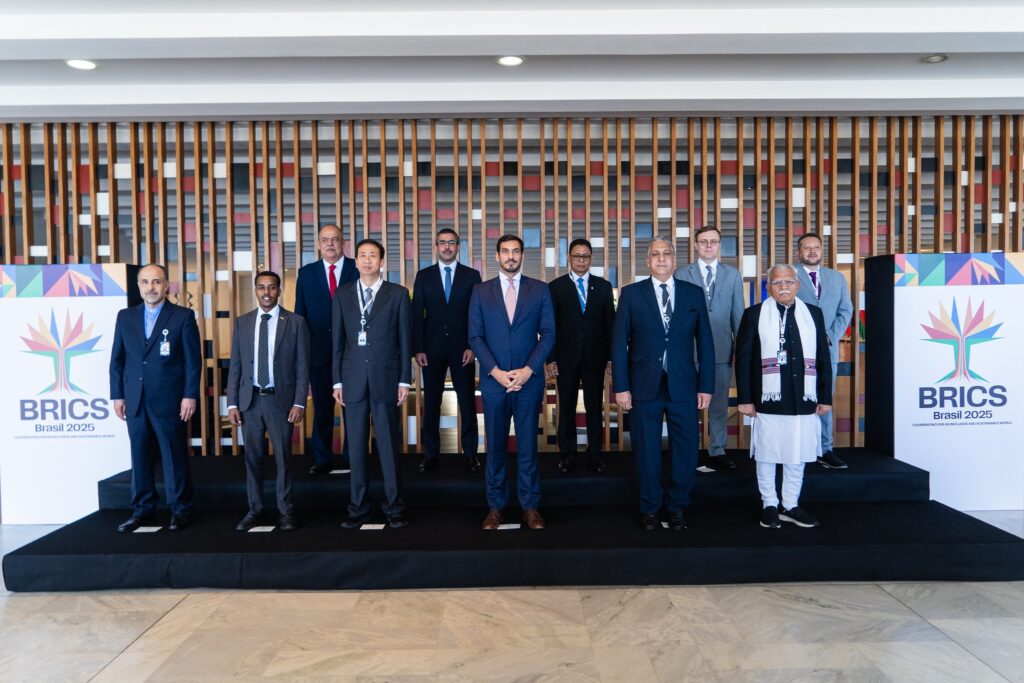Communiqué from the 10th BRICS Energy Ministers’ Meeting held in Brazil recently stresses fossil fuels’ continuing role, supports renewables, carbon removals, nuclear and abatement
The Global South can transition towards cleaner energy, but fossil fuels will continue to play an important role for the region. This was the crux of the vision laid out at the 10th BRICS Energy Ministers’ Meeting held in Brazil on May 19, 2025. Energy ministers from India, South Africa, Brazil, China and Russia acknowledged the need for a transition, but one that is practical, inclusive and rooted in ground realities.
Fossil fuels remain part of the mix
The joint communiqué openly acknowledged that fossil fuels will continue to play a key role in the Global South’s energy mix, even as the region works to curb its emissions. “…we recognise the need to promote just, orderly, and equitable energy transitions and reduce GHG emissions in line with SDG7 [the United Nations Sustainable Development Goal 7], our climate goals and according to the principles of technological neutrality and common but differentiated responsibilities and respective capabilities taking into account national circumstances, needs and priorities,” the statement read.
Countries have a right to independently pace their energy transitions, based on their needs and the resources available, the ministers declared. In other words, the world must move away from the one-size-fits-all approach to climate action.
All technologies on the table
The ministers emphasised the importance of the principle of technology neutrality. They did not back any specific technologies, but instead mentioned a wide range of energy sources and technologies, including renewable energy, bioenergy, fossil fuels, nuclear energy and hydrogen produced from zero and low-emission technologies, carbon abatement and removal technologies. This means that every viable technology will have a role to play in ensuring emission reductions, energy efficiency and universal access to energy.
Supporting renewables, scaling up finance
The ministers committed to continued cooperation in advancing renewable energy and low-carbon fuels. They welcomed the ongoing work on new BRICS reports focused on sustainable fuels and access to energy services.
On climate finance, the message was clear – there was an urgent need to bridge the financing gap for clean energy. The ministers called for “allocating adequate, predictable and accessible low-cost and concessional finance from developed to developing countries for just and inclusive energy transitions in line with the Paris Agreement and its principles, while considering the concept of transitional financing.” The ministers also demanded non-discriminatory access to energy markets and technologies.
This is significant because it comes at a time when climate finance from developed nations remains patchy and slow, and protectionist measures such as carbon border taxes and technology standards are growing.
The communiqué also highlighted the importance of the New Development Bank’s (NDB) role in “promoting infrastructure and sustainable development for energy transitions of its member countries, including financing in local currencies”. The NDB is a multilateral development bank established by the BRICS nations. Its acknowledgment and the mention of local currencies could be a possible sign that BRICS is looking to reduce its dependence on traditional financial systems based in the West.
Investing in planning, jobs and resilience
The communiqué also underlined the importance of domestic energy planning, capacity building, and clear policy frameworks. In this regard, it noted the establishment of the Global Coalition for Energy Planning (GCEP), which aims to support domestic energy planning capabilities.
The ministers highlighted the need for job security amidst transition. They highlighted the need to reskill and upskill workers in line with the energy transition—particularly in science, technology and engineering. Creating decent jobs and expanding opportunities for women and youth were also placed firmly on the agenda.
Critical minerals and resource sovereignty
BRICS nations also recognised the role that critical minerals play in the low-carbon shift. They called for fair, diversified, and resilient supply chains, and insisted that resource-rich countries retain sovereign rights over their mineral wealth. This could be read as a protectionist stance against external exploitation.
One eye on COP30
In a meaningful sign of what’s to come at COP30 in Brazil, the BRICS bloc expressed its “readiness to engage constructively towards positive outcomes [at COP30], with a view to promoting enhanced and meaningful support for developing countries in addressing the challenges posed by climate change.” This coordinated stance batting for the interests of the Global South is likely to shape the negotiating dynamics ahead of COP30, where finance will be on top of the agenda.
About The Author
You may also like
Litigation increases legalisation of protection against climate threats: Report
What COP30 reveals about the next phase of multilateralism
EU to waste billions on hydrogen pipelines in new PCI list, warns experts
India needs targeted public finance to scale green steel production
India Pushes for Critical Minerals Circularity and Collective Action on Climate at G20

